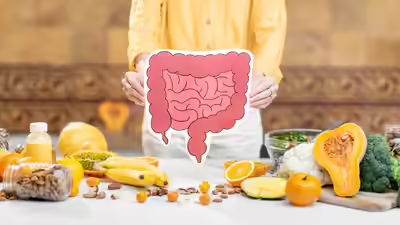Top 7 holistic tips to restore gut health after 30 (for better digestion and energy)

An “unhealthy gut” is the underlying root cause of a lot of insidious diseases in our bodies, and a journey towards a “healing” gut health is the one that is ignited by diversity, consistency, and self-care. Bloating, constipation, fatigue, and mental fog are some known symptoms of poor gut health, particularly those who advance in age past 30. Taking care of such issues do not require extreme gut cleanses or programs; instead, several practitioners advise going for a sustainable, holistic remedy that is grounded in science and supports lifestyle adaptation and eating patterns.These holistic tips to reset gut health after 30 years are recommended by Krishna Chaitanya, a lifestyle coach and trainer. Scroll down to discover some amazing tips that are backed by science.
Emphasizing frequent meal intake

It is imperative to understand that out gut loves a routine and so does our digestive system. Eating at the same or close to a particular time each day encourages a release of digestive enzymes aiding in not just good digestion but stable blood sugar levels.Mindful eating, thorough chewing and relishing every bite are some of the other practices that one should undertake for the digestive system to operate effectively without overloading the system, that is our gut, and opting for maximum nutrient intake. Food consumed slowly, and using all of one’s senses, results in satisfaction and enjoyment, minimizing grazing in an unconscious manner or rushing into decisions.
Addition of fiber-rich foods

Fiber is not simply roughage; it is the primary diet for healthy gut bacteria. Combination of different fruits, vegies, lentils as well as legumes, promotes gut microbiome diversity, that is required for a great immune system. The fiber in the body works as such, that is gradually relieves bloating and stomach discomfort, allows for the gut microbiota time to adapt.Best practice is the one to consume several different colors of vegetables and fruits each week, each varies with the type of fiber that feed the microbiota of the gut. A healthy and fiber-rich diet ensures regularity and keeps the microbes healthy, all while reducing inflammation and providing digestive comfort.
Adopting gut-friendly food options
Probiotic and prebiotic food are the gut’s best friend! Buttermilk, garlic, curd, onion, and fermented food such as kimchi, or kefir are food options that introduce healthy microflora and develop a medium for beneficial bacteria that results in minimal bloating and better digestion in the longer run.People who have hypersensitivities towards fermented food, can use alternatives depending on what they can tolerate very well. Including food that makes the digestive system stronger, gradually builds comfort during digestion and the uptake of nutrients
Role of movement

Daily movement largely improves gut motility, or the process by which the digestive system propels food and waste through the system. Even a ten-minute walk after meals at a rapid pace has been shown to boost the rhythmic contractions of the gut, reduce bloating, and relieve heaviness. Exercise does not have to be drudgery; it is regularity that is crucial, rather than intensity. Some exercises that contribute to regular bowel movement and a favorable gut environment are walking, gentle stretching, cycling, and yoga. Exercise modulates hunger and improves the growth of health-supportive bacteria in the gut by reducing physiological stress.
Stress management and priortising rest
The gut and brain communicate continuously. Sleep deprivation or chronic stress disrupts this connection and slows down digestion, and stimulates cravings. Practices such as yoga, journaling, meditation, and deep breathing break the cycle of discomfort and tension. Establishing a relaxing bedtime routine, retiring and rising at the same time daily, and avoiding screens before bedtime restores the internal clock. Not only does quality sleep revitalize the mind, but it also reconditions body systems, including digestion. Rest and relaxation remain undervalued tools in the pursuit of digestive and overall health.
Making sustainable changes
Quick-fix detox diets and juice cleansing overpromise and underdeliver. The gut fares best on habits built up through tangible daily disciplines, regimentation, and dietary variety. Drinking water, limiting processed foods, consuming whole grains and fresh fruits and vegetables, and avoiding added sugars form a foundation for long-term gut health. Putting these habits into the daily routine leads to incremental and sustained change.
Listening to the body’s cues
The body does not like to stay silent when there is a state of imbalance. Slight bloating, cravings, confusion, and skin breakouts can be indicative that the gut biome needs assistance. Paying attention to these subtle cues and tending to them preemptively through minor adjustments in diet, exercise, and stress reduction reinforces defenses.
Other perks of a healthy and balanced gut
A healthy gut microbiome goes far beyond “digestion”, the other benefits of a happy gut includes increased energy, increased immunity, better skin, lighter mood, all are directly connected to proper digestive health.Sound and science-backed practices sets the foundation for well-being at any time of life. Gradually, soft and consistent practices over time, offer more advantages than radical measures or other regimes.






